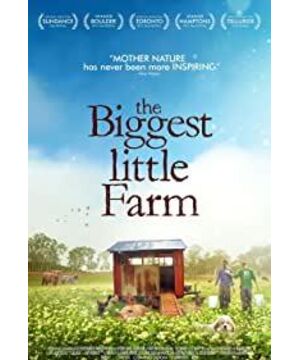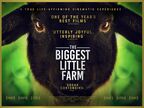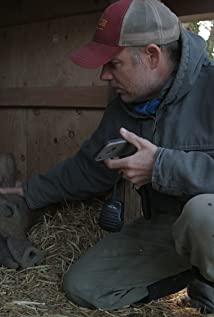If you grew up watching family farm stories, familiar with the farm's ducks, pigs, sheep, and faithful sheepdogs, the documentary "The Biggest Little Farm" will probably excite you. The film's protagonists (one of whom is also the film's producer) left the city and devoted themselves to the farm life because of the haunting images of farm life that lingered in their minds. Of course, real life on the farm isn't so dreamy—a fact revealed in a flashback at the beginning of the film, where the natural disasters the farmers have to experience are nothing short of biblical punishments.
Although some parts seem overly deliberate and hollow, overall the film is a very endearing exercise in environmental philosophy and idyllic nostalgia. The protagonists of the story are a well-to-do upper-middle-class couple (documentary makers and well-known organic food bloggers, respectively). But they decided to give it all up to go back to the farm, beat nature, and their final performance was pretty good overall.
Apricot Lane Farm, located in Moor Park, California, is a retro-modern farm that embraces biodiversity as the most efficient and ethical way to grow crops and livestock. According to the description of the website, the farm uses renewable soil to produce more delicious food. The whole farm imitates the ecological balance of the earth in a natural state according to the principle of bionics, and establishes a micro-ecosystem based on this, reducing the damage and change of the farm. be healthier. Some of the details about how the Chesters, John and Molly, brought the farm to life, seem to have been created deliberately for the filming, undermining the fairytale feel of the story itself.
According to the film, the Chesters came up with the idea of moving to the farm because of Todd, a dog they adopted. Todd was so mischievous that the landlord kicked the Chesters out of the apartment. Ordinary people can't afford to move in a short period of time just because they want a better home for their dog, let alone move to a farm of more than 240 acres and start a self-sufficiency project. Self-sufficient ecological experiment. Livestock, seeds, labor, and equipment are expensive, but the film doesn't tell how they did it, just brushing it off with statements like "some investors believe this primitive farming is the future of agriculture", anyway. People just do it. There are elements in the film that are too deliberate, more of a peddling performance than a statement, such as the Aaron Copeland-esque American-inspired soundtrack composed by Jeff Beale, John Chester 's line "Then I get it. . . . ” narration, and plenty of lyrical imagery—the figures of the Chesters and farm employees soaked in the sweet, soft light of the setting sun, and so on.
But after the Chesters settled down, they found that even on a small farm, there was an astonishing amount of things to deal with, and the film became more grounded and clear. Day in and day out, the protagonists tackle pressing needs, such as how to stop snails from invading their lemon trees, how to stop the wolves from slaughtering their ducks without slaughtering coyotes, and how to make an orphaned lamb grow up. If not, kill it immediately, and so on. The deepest theme of The Biggest Little Farm is how difficult and heartbreaking the process of achieving and holding on to your dreams is.
The above is the translation, Translator: Thibault, if any friends are interested in translating movie reviews, you can contact me~~
View more about The Biggest Little Farm reviews








